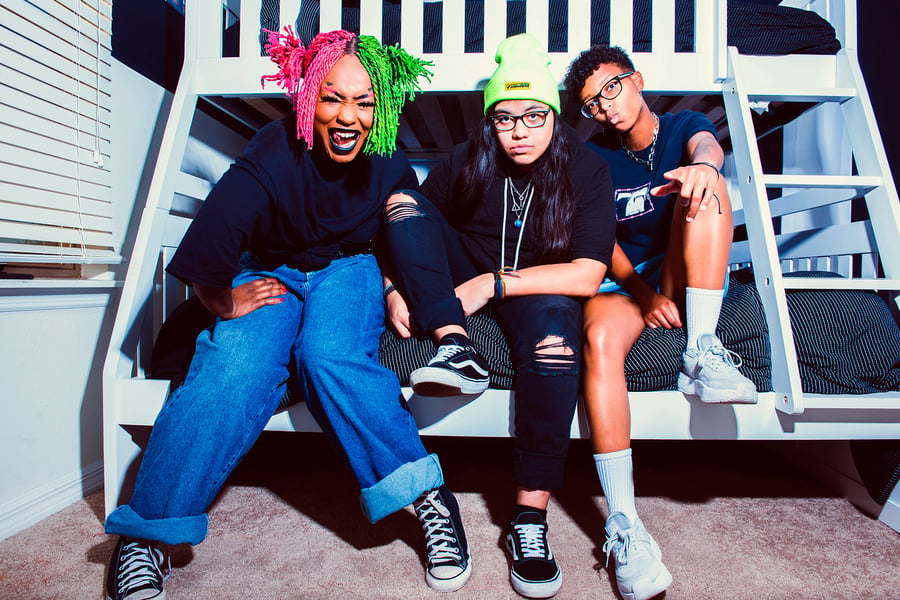
Since pop punk broke through in the Nineties, the genre’s most prominent faces have been largely white (not unlike dozens of other scenes). But as the music industry begins waking up to its history of race and gender inequality, one band is ready to rewrite that unspoken rule: Meet Me @ the Altar, one of 2021’s most exciting new rock acts.

Guitarist-bassist Téa Campbell, 20, and drummer Ada Juarez, 22, met online in 2015 after Campbell stumbled upon Juarez’s drum cover of a Twenty One Pilots song. Despite living in different states (Florida and New Jersey, respectively), the two became fast friends and decided to start a band. They held online auditions, where Edith Johnson, 20, tried out by singing Paramore’s “All I Wanted”; the Georgia native wasn’t chosen at first, but she was persistent. “Edith supported us throughout the two years that she wasn’t in the band,” Campbell says. “She was literally texting me every day [asking]: ‘Are you guys looking for another singer?’” In 2017, Johnson got the gig.
Last year, the trio signed with Fueled by Ramen, the Warner Music-backed label responsible for launching some of the band members’ biggest influences — including both Paramore and Twenty One Pilots, as well as A Day To Remember and Fall Out Boy — and re-released the single “Garden.” An exhilarating blast of sticky-sweet vocals, fluttery electric riffs, and a dangerously catchy chorus (“Your flowers will finally grow!”), it’s all but guaranteed to have you longing for the days of black eyeliner and studded belts. “I don’t think any of us have fully wrapped our heads around [the record deal] yet,” Campbell says. “We grew up idolizing these people our whole lives, and now we’re on the same label as them.”
The band first caught the attention of Elektra Music Group vp of A&R Johnny Minardi after some supportive tweets from All-Time Low’s Alex Gaskarth and The Wonder Years’ Dan Campbell (“I remember screaming when I saw all the notifications,” Johnson says). The members have also benefited from Halsey’s Black Creators Fund, which offers financial support and resources for black artists in need.
Still, their rise to success hasn’t been without challenges. On many occasions, they recall feeling like they had to prove themselves worthy while booking small gigs. “We would have to play with the local bands, but they’re all white dudes who didn’t really want us there,” Campbell recalls. “They were never explicit about it, but you can just tell. So it isn’t fun. But at the same time, we had to go through it for it to pay off the way that it did.”
Love Music?
Get your daily dose of everything happening in Australian/New Zealand music and globally.
When it hit in May 2020, “Garden” and its uplifting spirit provided many pop-punk fans with some much-needed comfort during quarantine’s peak. “It’s OK to not be OK, and you have people who are there for you,” Campbell says. “We wanted to get that message across to everyone. We didn’t know coronavirus and protests were going to happen, but it was a message that the world really needed to hear throughout all of that.”
The band members weren’t too fazed by the new ways of communication that quarantine required: In MM@TA’s early stages, the Gen Z musicians created songs over voice notes. “We grew up with technology,” Johnson says. “So it’s just like texting normally, but having the idea, recording it, and being like, ‘What do you think about this?’”
The three bandmates now live together in Florida, where Campbell still works a day job and Johnson attends virtual college classes. They refer to themselves as sisters often, and their connection is evident even in their band name, which came from a shared admiration of a video game. “I just started naming off Mortal Kombat characters and I got to Sub-Zero — which is Téa’s favorite character,” Juarez says. “I told her it was mine too, and she said, ‘Marry me.’ I responded in all caps: ‘MEET ME AT THE ALTAR.’”
While the pandemic has slowed them down a little, these black and Latina women are eager to give their genre some of the diversity it’s been missing for too long. “We knew going into this that it wasn’t going to be easy,” Campbell says. “But we accepted that we have to take the harder way, so that the 12-year-old black girl looking up to us can do it the easy way.”
One of their biggest hopes for 2021 is to continue shattering boundaries so that more artists of color get a platform. “When shows come back, venues need to book diverse bands,” Johnson says. “Pay attention to your scene — and make sure your show lineup is not just all white, straight cis men.”
From Rolling Stone US



































